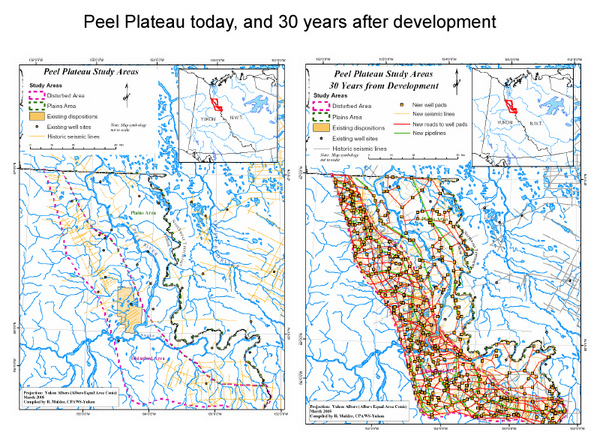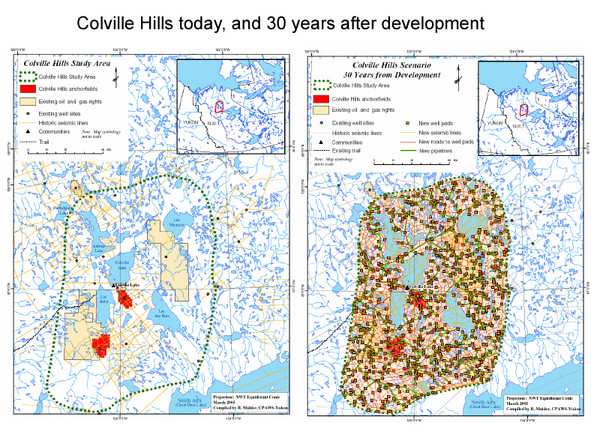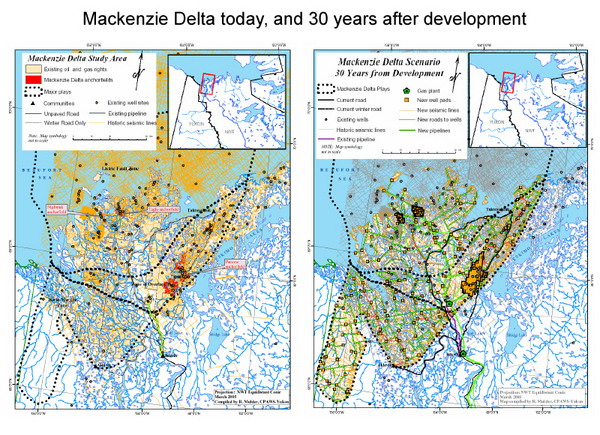

Proponents hope to get pipeline flowing
COMMENT: It may be pointless to note that in 2001, when the Mackenzie Gas Pipeline made its first appearances on this website, the project was going to cost a mere $3 billion. Now it's $16 billion and climbing. But it's undeniably interesting.
Not once have the MGP proponents (led by Imperial Oil) stopped clamouring for a reduced regulatory burden and a greater public subsidy.
But in the 1970s with the Mackenzie pipeline proposal at that time, and in 2001 with this version of it, and today, the big concerns remain the environmental and social impacts on the land and communities of the north. Construction of the Mackenzie Gas Pipeline will unleash immediate and extensive gas production all along the pipeline route.
In 2005, the Canadian Parks and Wilderness Society undertook a mapping exercise designed to illustrate these impacts at various stages to full build-out. Small versions of these maps are copied below. They are published in higher resolution in a Pembina Institute publication entitled A Peak into the Future.
Infrastructure - pipelines, roads, transit - begets construction and development. Building this pipeline will have the same consequences in the north as water on a desert, but what will spring forth won't be carpets of gorgeous flowers - it'll be seismic and haul roads, pipelines, drill pads, and waste dumps.
SHAWN MCCARTHY
Globe and Mail
December 14, 2007
Proponents of the $16-billion Mackenzie Valley Pipeline have presented a new financial plan to the federal government in hopes of kick-starting the long-stalled gas pipeline from the Arctic, Industry Minister Jim Prentice said yesterday.
Mr. Prentice met in Calgary yesterday with executives from Imperial Oil Ltd. and TransCanada Corp., who have fashioned a new partnership to finance the proposed main pipeline and natural gas gathering system in the Mackenzie Delta.
"I intend to analyze and review their proposal as expeditiously as possible," Mr. Prentice said in the statement.
It is believed that TransCanada, an energy infrastructure company, would take a majority stake in the mainline pipeline project, which would cover half the estimated $16-billion cost, while the producers, which include Imperial, ConocoPhillips and Royal Dutch Shell, would finance the gathering system and the development of the gas fields.
The Aboriginal Pipelines Group - representing native groups in the north - would have a large minority stake in the pipeline, perhaps as much as 40 per cent.
TransCanada chief executive Hal Kvisle said in an interview this week that the pipeline project is essential if Canada is to have the gas it will need in the coming years, and that some federal assistance would be required.
Imperial Oil Ltd. had been leading the consortium of producers that intended to finance and build the project. However, last winter, Imperial announced that the projected cost had mushroomed to $16.2-billion from $7-billion, and indicated it would be impossible to proceed without significant federal assistance.
TransCanada, which also has submitted a proposal to build an Alaska natural gas pipeline, has long been waiting in the wings to assume control of the Mackenzie project. It stepped in when it was clear Ottawa and Imperial Oil had reached an impasse earlier this year.
Mr. Prentice - who has responsibility for the northern pipeline - said last summer the pipeline project would have to be "reinvented."
Still, a spokesman for Imperial Oil said this week that the company remained committed to the pipeline project.
David MacInnis, of the Canadian Energy Pipeline Association, said yesterday that his group has long advocated that Ottawa and the oil companies move to a "Plan B" that would see a pipeline operator build the main leg of the Mackenzie project, while the producers focused on field development and the gathering system.
He said TransCanada and APG would be able to finance the pipeline themselves if they could get long-term commitments of sufficient quantities from the big four producers, plus a host of small operators who have been exploring for gas in the Arctic.
While he stressed that he was not privy to details of the plan, Mr. MacInnis said the federal government would likely be called upon to streamline the regulatory process to protect against costly delays, and to provide accelerated tax write-offs of capital expenditures.
Prentice reviewing Mackenzie Valley pipeline financial plan
CanWest News Service
Monday, December 17, 2007
Canada's Industry Minister Jim Prentice is reviewing a financial plan submitted to him Friday by the backers of the $16.2-billion Mackenzie Gas Project.
Following meetings in Calgary with the project's key participants, Prentice would not detail the fiscal package but said it would be reviewed and analyzed as expeditiously as possible.
Projects proponents led by Imperial Oil Ltd. have been in talks with Ottawa for a year to try to hammer out fiscal terms for the giant, 1,220-kilometre pipeline and gathering system that could deliver as much as 1.9-billion cubic feet of natural gas per day from fields in the Mackenzie Delta of the Northwest Territories to the Alberta hub and onwards into the North American market.
While regulatory hearings have wrapped up, the project has stalled as a result of cost increases and a failure to reach a fiscal deal with the government.
Imperial has at times in the past looked for financial help from Ottawa to help make the project economic.
In recent weeks, the Financial Post reported the producer partnership of Imperial, Imperial's parent Exxon Mobil Corp., Conoco Phillips and Royal Dutch Shell would be prepared to hand control of the pipeline over to TransCanada Corp., Canada's largest pipeline company, which has financially backed the project's fifth partner, the Aboriginal Pipeline Group (APG), an aboriginal enterprise.
TransCanada would take the lead with 60-per-cent ownership, with the rest going to the APG, sources close to the project said.
That structure, under which the project and its tolling system would be regulated by the National Energy Board, was preferred in the eyes of Ottawa based on comments made by Prentice last summer.
Under that project structure, sources said Ottawa would be asked to assist via loan guarantees, guaranteed shipping commitments or other breaks.
Prentice's statement Friday said the government of Canada has no interest in owning any portion of the project or "in subsidizing petroleum companies."
"It must be a private sector investment, driven by commercial considerations," he said.
"It must result in tangible benefits for northerners and Canadians in general. Participation of the Aboriginal Pipeline Group must remain an important aspect of the project."
TransCanada Corp. chief executive Hal Kvisle told reporters last week that his company taking the lead role is just one in a range of options that had been discussed.
© CanWest News Service
Posted by Arthur Caldicott on 17 Dec 2007

